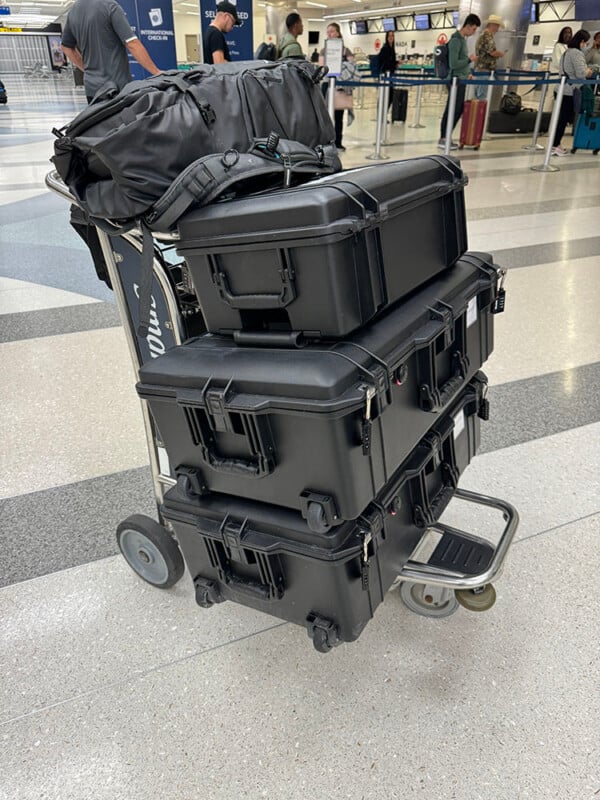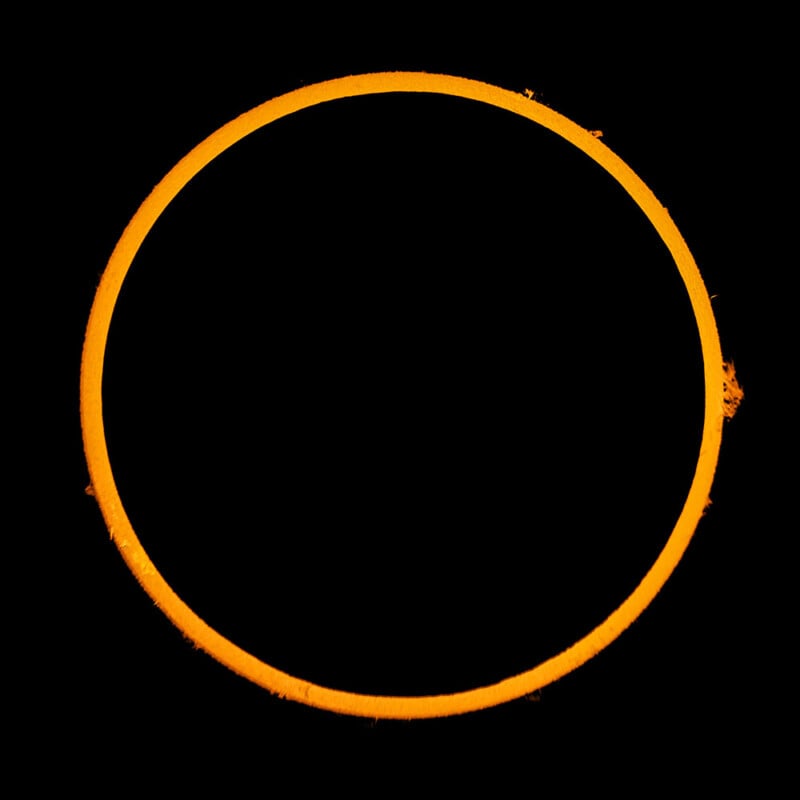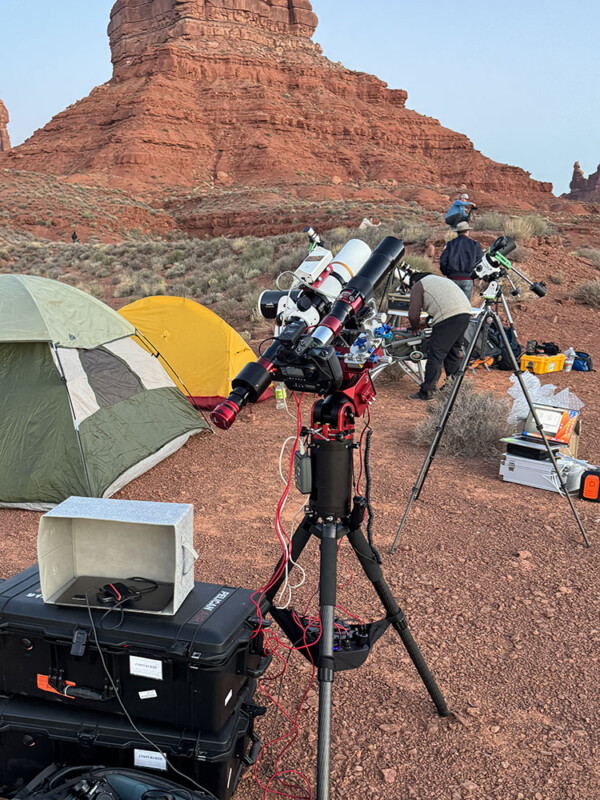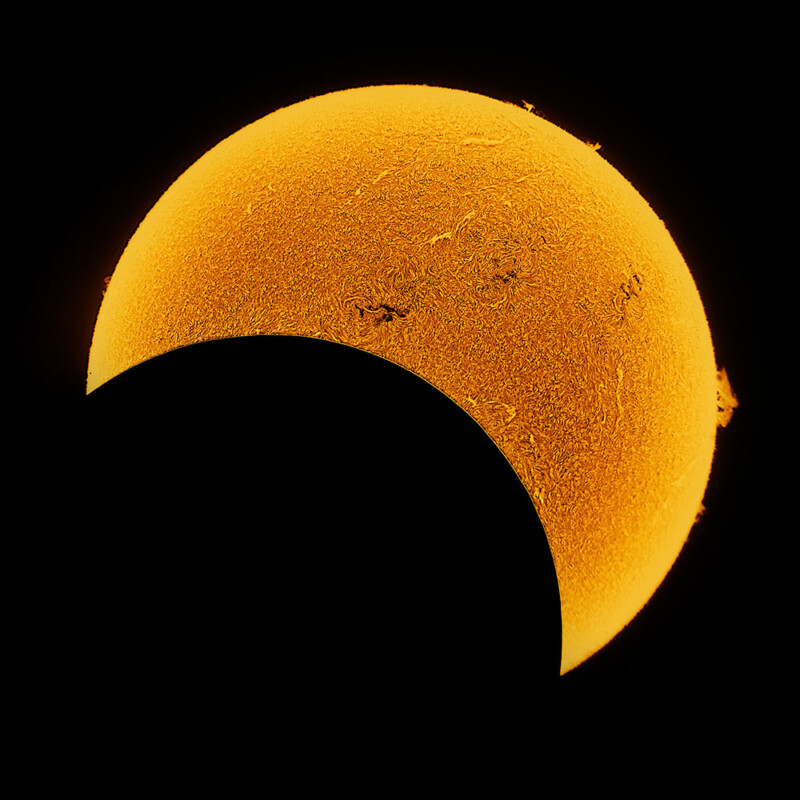Photographer Captures Epic 8K Timelapse of the Ring of Fire Eclipse
A photographer has released a jaw-dropping timelapse video made up of almost 2,000 images of the recent ring of fire solar eclipse showing the celestial event in unprecedented detail.
The 8K video by astrophotographer Jason Kurth of the Moon blocking out the majority of the Sun was well over a year in the making and required him to buy a new computer to handle the data processing.
Kurth tells PetaPixel that he flew from Florida with 200 pounds of photo gear to the centerline of the October 14 eclipse in southeast Utah where he shot over 200,000 photos.
“Over four terabytes of data were gathered and processed and this project required a newly built 24-core workstation with 192 gigabytes of RAM to handle processing the data,” he says. “I don’t believe any annular eclipse has been captured in this much detail before.”

Kurth captured the ring of fire eclipse with a custom double-stacked hydrogen alpha solar telescope and a monochrome camera capable of capturing the solar chromosphere in ultra-high resolution. The monochrome camera has a higher sensitivity to light but it means the color is added in post-processing.
“I like doing things that are challenging and different; most people photograph eclipses with white light solar filters but far fewer are photographing the chromosphere of the Sun and catching solar prominences and flares,” he explains.
“Timelapse adds an even bigger challenge and I had seen some bits of partial eclipse timelapses through hydrogen solar telescopes that were inspiring, but never a full annular one, so I knew I wanted to do it.
“And I wanted to do it in large enough resolution to be able to catch the movement of the surface of the Sun and flares at the same time. I had to do a lot of experimenting with equipment to put together the right setup that would get me there.”

Haters Will Say it’s Fake
Since Kurth posted the video to his Instagram account a week ago, it has gone viral racking up over 850,000 views — It has also attracted a slew of comments suggesting the video is fake because the Sun appears to be still.
“I get it a little when trying to look at a phone screen at first glance, some features are so massive they may appear static and the large prominences are many tens or a hundred times larger than Earth and can move on a timescale of days and not hours,” he says.
“But there is clear movement of other smaller prominences and the surface visible in my video.”

Kurth says he released the higher-res version of the video to his YouTube page where the Sun’s movements are more obvious but continues to receive comments that the video is fraudulent.
“The fact that people are still trying to say it’s fake is just baffling but I have given up trying to argue with them if they can’t bother to read the other comments or look at the video and see with their own eyes,” he says.
Kurth adds that he put in a lot of editing work to stabilize the center of the Sun which he feels adds to the “uncanny aspect” of the timelapse.
“Any solar or lunar eclipse timelapse is challenging because the Sun and Moon will drift off center even with an equatorial tracking mount and need constant small corrections to the mount to keep it centered in the camera over a span of hours,” he explains.
“When you assemble that into an eclipse timelapse it will look very jittery with the Sun/Moon jumping around from all the drift and corrections. Software does not handle fixing this very well automatically and most eclipse timelapses do not correct for it very well.
“I had to painstakingly manually correct all the drift and jitter in the video to try to keep it perfectly centered on the screen, so I guess I was successful if people are mistaking it for a single still image.”

Despite some conspiracy theorists hating on his work, Kurth says the reaction has been “overwhelmingly positive” and is proud that his hard work is being recognized.
“I have gotten a lot of really nice comments from people who were inspired by seeing this, with a surprising number saying things along the lines of it being the greatest video they’ve ever seen; I didn’t think it was that good but it is touching,” he says.
“I feel photography is often thankless and it is a real struggle to get noticed on social media even with a lot of hard work on things that may deserve it compared to what ends up actually being popular.
“If there was one video/post of mine I really feel should go viral it is this one, so I’m glad the reaction has been so positive.”
More of Kurth’s work can be found on his Instagram and website.
Image credits: Photographs by Jason Kurth.